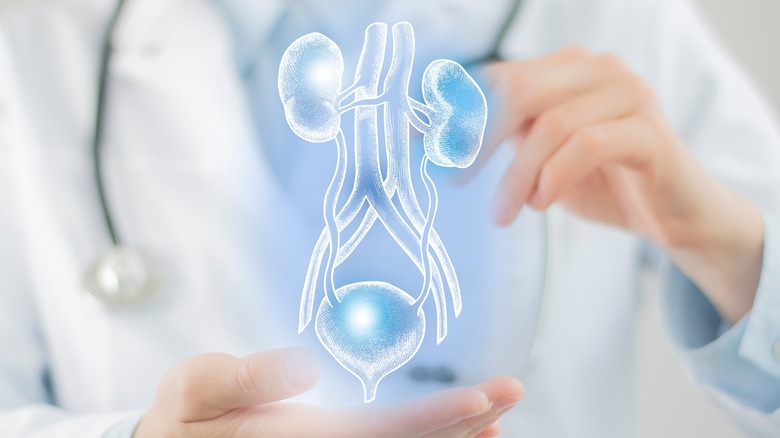How Diabetes Affects Your Bladder
Diabetes is a chronic disease that causes problems with the hormone insulin, leading to issues with blood sugar absorption, per the Centers for Disease Control and Prevention (CDC). Type 1 diabetes is an autoimmune illness that causes the body's immune system to attack the pancreas. As a result, your body fails to produce insulin. It's a life-long disease and has no cure. On the other hand, if you have type 2 diabetes, your body does not use insulin properly, leading to excess blood glucose. However, with type 2 diabetes you can promote better functioning and production of insulin by following a healthy lifestyle.
Being diabetic can take a toll on your physical and mental well-being. According to WebMD, high blood sugar levels may cause issues with eyesight, hearing, and thirst. It can cause velvety dark patches on the skin, and even lead to increased infections. Moreover, diabetes may cause complications with organs. Most significantly, it can have a negative effect on your heart, kidneys, and even your bladder. Let's take a closer look at what happens to the bladder when you have diabetes.
How diabetes impacts the bladder
Diabetes can often have a critical effect on bladder function. For example, you may experience neurogenic bladder -– a neurological condition stemming from nerve damage, resulting in a decreased need to pee even if the bladder is full (via Diabetes.co.uk). High blood glucose levels may also lead to urinary incontinence, warns the National Institute of Diabetes and Digestive and Kidney Diseases (NIDDK). In this condition, you may have frequent urges to pee, and may lose control over voluntary urination, which could negatively affect your social life as you constantly search for a bathroom. Additionally, urinary incontinence or bladder problems can affect sleep, as you may need to wake up more often to go to the toilet. This complication affects both men and women.
One of the reasons that diabetes may cause an increased need to pee is that due to higher blood glucose levels, the kidneys start over-functioning to filter the glucose, reports Mayo Clinic. The excess sugar then goes into your urine and your body prompts you to release it frequently. This could also leave you severely dehydrated. If you notice any of these bladder complications from diabetes, consult a doctor to treat the symptoms ASAP.


